From November 13th to November 19th, the inaugural class of Schwarzman Scholars visited Xi’an and Baoji in Shaanxi province and Suzhou in Jiangsu province to take part in the course Deep Dive. The 108 Schwarzman Scholars, from 31 countries and regions, went to different places with distinctive Chinese characteristics, such as rural areas, grass-root level communities, enterprises and institutions, to gain first-hand understanding of the actual Chinese development through observations, interviews, participations, communications and discussions with the local people from different sectors and different businesses. The visits were also aimed at disclosing the driving forces of Chinese social and economic development from multiple angles, pondering over the challenges and opportunities in China from various perspectives, and deepening the friendship with Chinese people through face-to-face interactions. The students would incorporate the lessons learnt into the final team practice report, which would also serve as the policy recommendations for the three cities’ local governments.
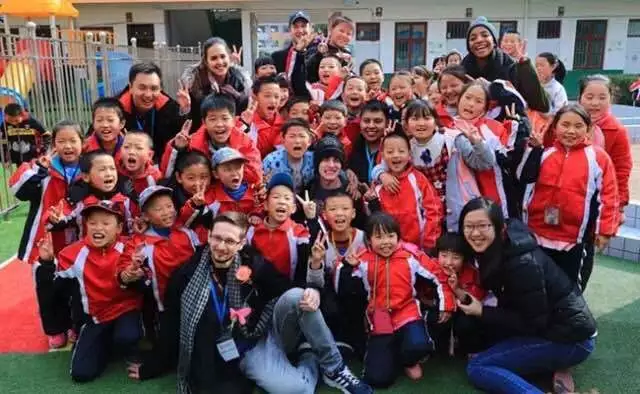
Group photo with pupils in Tuoshi Town
As a compulsory course for the Schwarzman Scholars and the key to cultivate future global leaders, Deep Dive was designed by the Academic Advisory Council of Schwarzman College and well-known professors at home and abroad under the guidance of renowned professors. Such a field-trip course is a beneficiary complementation to the in-class learning and book knowledge, and an important and innovative component of the interactive teaching system at Schwarzman College.
71 students took part in the field trip in Shaanxi Province. They were divided into 5 groups to proceed with their research: economy, rural areas, education, social development, and political leadership, and carried out the field work around the areas of Xi’an and Baoji. In Suzhou, 37 students carried out the field work and research studies within the municipal area in 2 groups, business and rural areas. Mr Cheng Jianping, Standing Vice President, Tsinghua University, and Mr Yang Bin, Vice President, Tsinghua University, personally led the Schwarzman Scholars to participate in some of the field work and research studies.
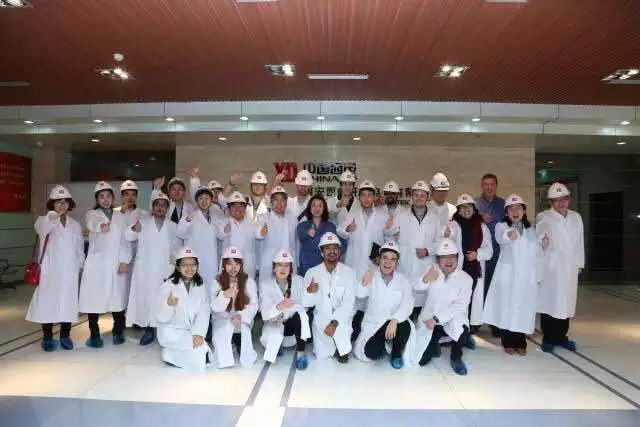
Visit to China XD Group Corporation
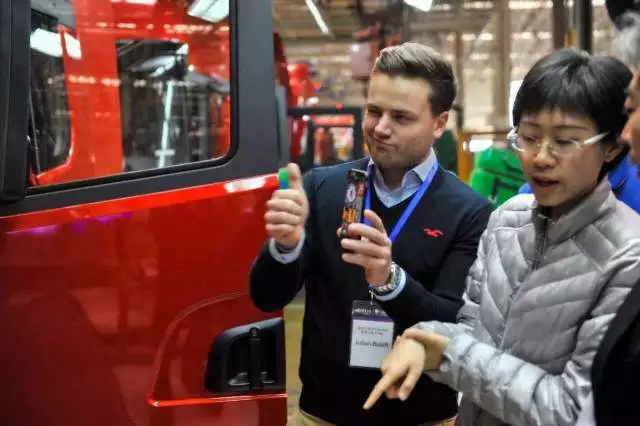
Thumbs-up to the heavy truck production line of Shaanxi Automobile Group Co., Ltd
In Shaanxi Province, all groups went to 20 government departments, enterprises and institutions, such as China XD Group Corporation, Shaanxi Automobile Group Co., Ltd, Xi'an Longi Silicon Materials Corp., Daming Palace Relics Protection Office, New Town Grads Home, Xi’an Legal Office, Baoji Municipal Government, Dongling Group, Tuoshi Town in Chencang District, Qianyang County, Fengxiang County. They had a better chance to see the big picture of the Chinese way of development, such as the state economic development strategies, self innovation and economic contribution of the state-owned enterprises, education and poverty-alleviation, rural development, the government’s work mode, cultural protection, community development and the rich folk life stories.
In Baoji, as all could see and hear for themselves, the grass-root level cadres were working intensively, dealing with all sorts of complicated issues; in the state-owned enterprises, the technicians kept working diligently in their career for dozens of years realizing their self-worth; in the Community Councils, the grass-root level cadres offered policy support to creating jobs and innovation for young people; in Dongling Group, there were stunning stories about how the township enterprises led entire villages out of poverty; in Qinling Mountainous Areas, there were greatly improved education facilities and the talented children taught the Schwarzman Scholars just how rural education was like; in the Xi’an Legal Department, the Scholars participated in the process of trial administrative reviews to gain a deeper understanding of the progress of China’s rule of law.
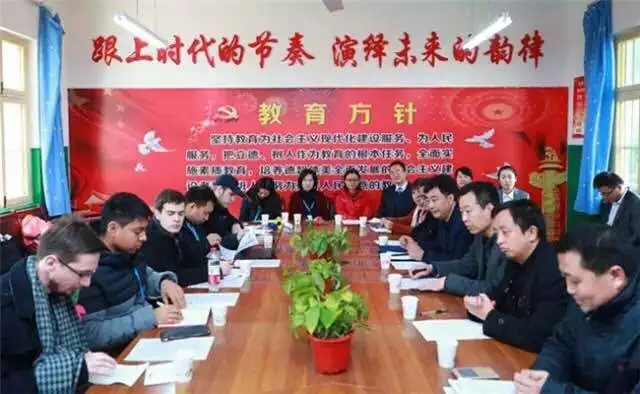
Discussion on China’s education development
On November 18th, Mr. Hu Heping, Governor of Shaanxi Province held talks with the Scholars participating in the field trip in the Shaanxi Province. Mr. Hu Heping encouraged the Scholars to dig deeply to explore Shaanxi’s development, Chinese development, to experience the characteristics of China’s national governance with the field studies. It is also important to take on the tasks which would be conducive to China, Shaanxi, and to contribute their talents to China’s future development.
At the same time, the Scholars in Suzhou went on informative field trips and studies gaining rich knowledge in various areas, such as culture, economy, education and people’s livelihood, etc.
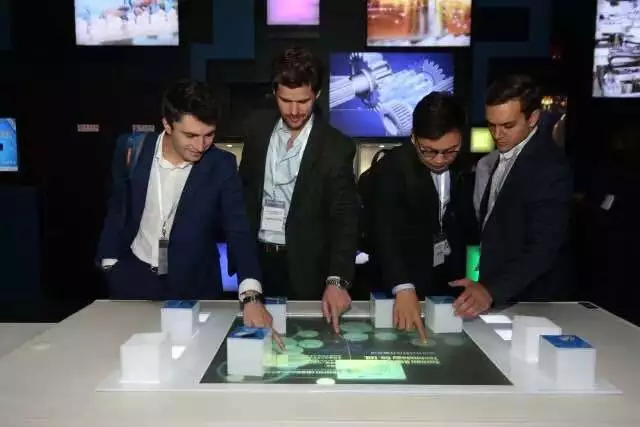
Visit to Suzhou Industrial Park
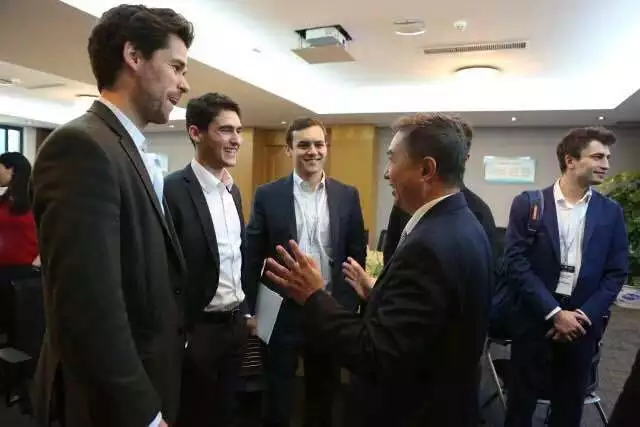
Discussion with Suzhou private entrepreneurs
During the talks with the Suzhou Municipal Government, officials from Suzhou Municipal Development and Reform Commission, Suzhou Municipal Bureau of Commerce, Suzhou Municipal Foreign Affairs Office gave detailed introductions of the promotion of Suzhou historical reforms and cultural education base in Suzhou economic development, shared the comprehensive data to illustrate the characteristics of Jiangsu South open economic development and introduced the main work and opportunities facing the key transition period. The Scholars also went to the Suzhou Industrial Park, Kunshan Economic Development Zone and Suzhou National Hi-Tech District to visit many private enterprises, such as Innovent Biologics, Snap-on Incorporation, Jiangsu Skyray Instrument, Neway CNC Equipment, to gain a better understanding of how the Jiangsu South Mode works and the local governments’ experiences in attracting businesses and investments.
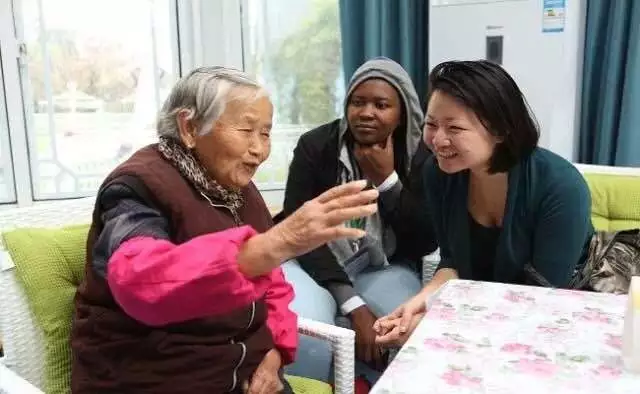
Listening to the history of Dianshanhu Village
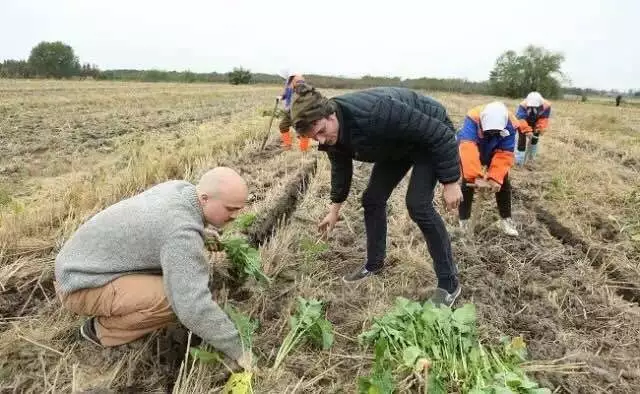
Working with the villagers in rain
The Suzhou rural area group of students went to Dianshanhu Town in Kunshan District, to carry out the grass-root research focused on the new rural development. During the talks with the local government, the township companies and cooperative representatives, the Scholars were incredibly impressed by the highly efficient service measures of “solving all sorts of problems within half an hour “of the grass-root officials. At the local Kangleshou Nursing Home for the elderly, Scholars were exposed to the brand-new nursing service concept of “treating others’ parents as one’s own children” and “running the nursing home just like a kindergarten”, they also had the opportunity to actively engage in discussions with young village officials and young Entrepreneurs on topics such as: grass-root policy making, solving the actual problems in urbanization and community governance. The Schwarzman Scholars went to the paddy fields, to visit Shengtai Village Rice Demonstration Area, Liurudun Happy Farm Village, where they experiences the local farming lives by cooking and working in the field in the rain together with the locals.
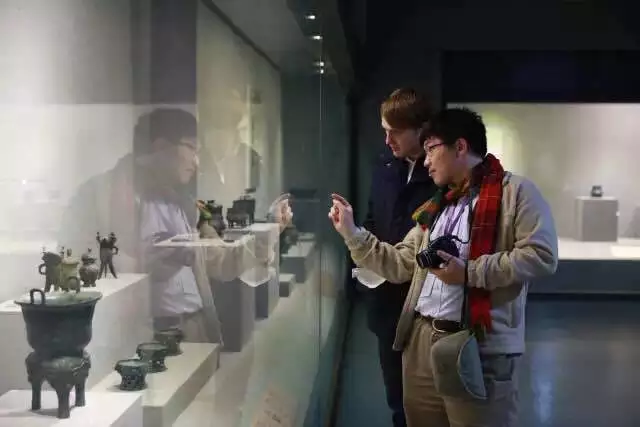
Visit to China Bronze Ware Museum
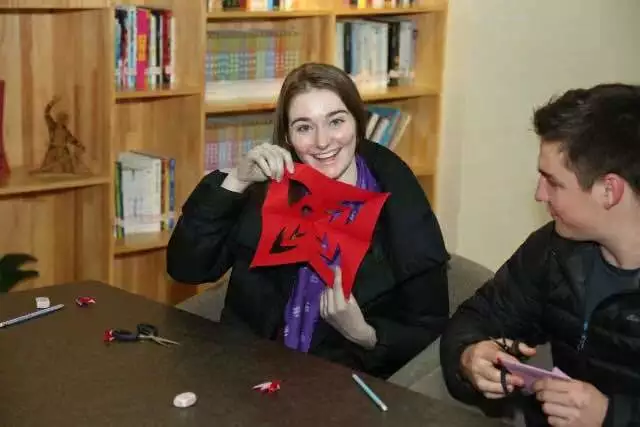
First experience in paper-cutting
The field trip groups to Shaanxi and Jiangsu also had the opportunity to visit Terracotta Warriors, Hanyang Mausoleum, Big Wild Goose Pagoda, Stone Tablet Forest, China Bronze Ware Museum, Shaanxi History Museum, Tiger Hill, Hanshan Temple, Humble Administrator Garden and Suzhou Museum, to appreciate the local traditional plays which deepened their understanding of the uniqueness of the cultural features and cultural heritage of both places. The Scholars expressed their heartfelt appreciate by delivering English lessons to the rural middle schools, and wrote the market investigation and research report for the apple industry, hoping to contribute back to the local economic and social development.
The Scholars from the field trip expressed their own feelings:
Zhang Chi, from China, said, “The Communist Party looks mysterious for many foreign Scholars. As a Communism Party member, I would talk with them about the relevant topics. But they have to see it for themselves. In the field trip, there are lots of exciting and living stories of the communists who work hard to build the grass-root organizations for the Party to serve the employees, the residents and the students in an all-around way. The Scholars thus can feel the great sense of mission and vitality at the grass-root level of Chinese Communism Party. The social practice is living and vivid lesson on the Party which cannot be replaced by just the books. ”
Chen Haoyang, from Hong Kong China, said, “After learning a day’s work schedule of Jiang Ling, Deputy Head of Fengxiang County, Baoji City, many of us have been inspired and encouraged. We gained strengths in it and we believe that politics could be driven to promote the livelihood of the public. ”
Jasmin Stadler, from Switzerland, said, “The Deep Dive field trip opens a window to understand deeply Chinese society and politics. They left great impressions as follows: the Chinese statesmen are full of coordination powers, and are understanding and sharp-minded. They could take all the complicated factors into consideration before mapping out the full plan for they face all kinds of conflicts and pleadings in everyday tasks. ”
Luis Filipe Checa, from Peru, said, “The Deep Dive is a great opportunity to understand China deeply. China is far away from Latin America, but both face similar challenges. I sincerely hope that in the future both nations could complement each other and rise to the challenges together, making China, Latin America, and the world a better place to live for everyone.”
Max Song, from the US, said, “When we were carrying out our research in Qianyang County, Shaanxi, we saw the grass-root level government help solve actual problems for everyone, taking into account what the left-behind children and seniors truly needed.” After discussing with the rural areas’ seniors, we learnt that they moved out from the caves to the buildings and received subsidies from the government if they grow the grains every year. The kids can also benefit from free education for twelve years. The standard of living for the villagers continues to improve and China’s economic development has brought great benefits for everyone. The Scholars witnessed such realities for themselves, and we all strongly feel how much attention the Chinese government had paid to share the economic development achievements with all its people which would certainly serve as great model for other country to learn from.”
Zhao Chuang, from China, said, “We got to know the working state of the grass-root level officials and the grass-root level situations right before our eyes through the field trip. The local officials were working diligently and contributed themselves to the interests of the people humbly, and there is no reason not to believe that our country is striking for the better. I always hope that I would work in the public sector when after graduation. The field trip has reiterated to me the importance of both actions and ambitions: “Not only should we have ambitions, we must act upon them. Not only should we possess the thoughts to make something happen, we must also have the right methods.” “We need to get out of our bubble, and see the real world for ourselves for what it really is”
Noah Elbort, From the US, said, Dianshanhu County is miniature of the transformation of Chinese economic development, undergoing the gradual transforming process from the labor-intensive manufacturer. The county is actively exploring the tourism industry labelling it as a relaxing holiday to attract consumers from Shanghai and other neighboring big cities. Such social and cultural transformation is with Chinese characteristics and some similar experiences can be found in the rural development of other OECD countries. ”
Danai Mavunga, from Zimbabwe, said, “This field trip gave me a direct perception of the development of the Chinese nursing industry. The seniors in the nursing homes are well taken care of by the professional working staff and they enjoy the company of fellow seniors. Living with dignity is what these seniors take pride in as well as knowing that they will pose no burden for their children. This model should be taken as a great example for African countries to learn from.”
Bonnie Lei, from the US, said, “I was so happy to have the opportunity to go to the grass-root level rural areas in Suzhou, where I cooked and worked in the fields together with the local people and talked with them, learning the pace of Chinese urbanization through face-to-face conversations. There are many villagers from Liuhedun Village who transferred their own cultivated lands to the rural cooperatives. Through this new agricultural framework, the villagers live better off now by the enterprise dividends and pensions, leave them full of confidence towards the future, which has definitely left a lasting impression on me.”
Jose Luna, from Mexico, said, “The field trip enabled me to deepen my understanding on the Suzhou Economic Development Zone’s development mode, the great vitality of the local private enterprises and the specific challenges facing the talents, technologies and market, etc. I am especially impressed with the fact that Suzhou does a great job in protecting and preserving the traditional historical culture during its rapid economic development, which serves as an important reference for other developing countries.”
Mostafa Allam, from Egypt, said, “The policy support from Suzhou Municipal Government played a decisive role in the success of the economic development zone and attracting businesses and investments. Through the talks with the local private enterprises, I was able to sense both the opportunities and real problems they face in economic globalization. All these first hand observations has given me a much better understanding of the Chinese economic development.”
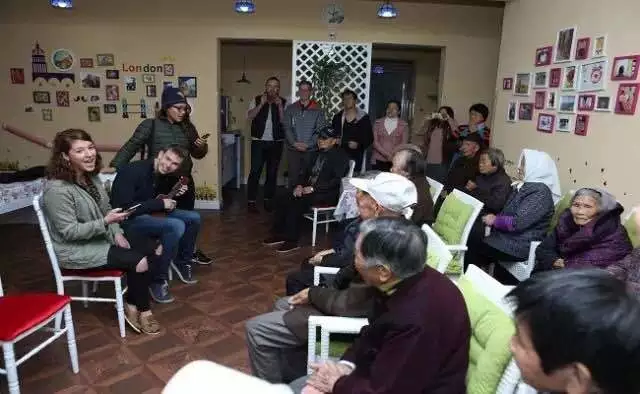
Foreign students singing Chinese Songs to seniors
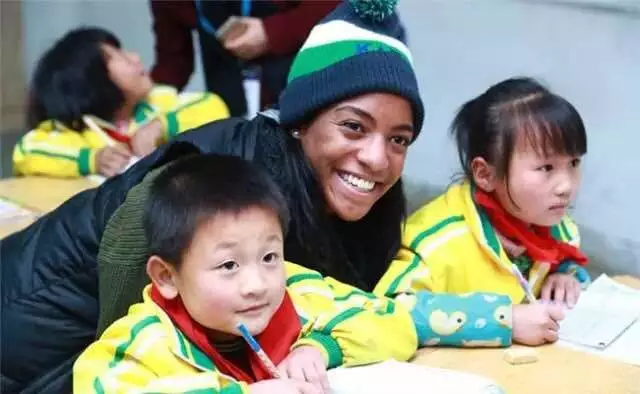
Visit to local primary school
The inaugural Deep Dive for Schwarzman Scholars chose Xi’an, Baoji and Suzhou due to the following factors. First, Schwarzman Scholars must get to know the profound Chinese historic and cultural traditions if they wanted to understand China. Xi’an was the ancient capital for thirteen dynasties, one of the important cradles of Chinese civilizations and Chinese origins and the start of the Silk Road. Baoji has a history of 8000 years, and is also the birth place of the Zhou and Qin Dynasties. Suzhou is one of the first batch of 24 national historical and cultural cities, home to many talents since the ancient times, and a land of milk and honey. These three cities are outstanding in their historical and cultural spirits. Second, from the perspective of modern social and economic development, Suzhou, located in the east coastal areas and Yangtze River Delta, is the typical representative of the Jiangsu South Mode economic development. Xi’an and Baoji, located in the west, are the prominent representatives of the western economic and social development. Third, from the city scale and economy volume, Xi’an and Suzhou are considered 2nd-tier cities, while Baoji is considered as a 3rd-tier city, with all three of them manifesting the diversities and differentiations of Chinese society.
David Li, Dean, Schwarzman College, Tsinghua University, said that Deep Dive was a key component of the Schwarzman College curricula. The Schwarzman Scholars could learn much more from the field trips than in the books and classrooms. Such experience type teaching course enabled the Scholars to gain a deeper understanding of Chinese politics, economy, society and culture. It also fostered the multi-culture senses and cross-cultural communication abilities of the Scholars. The Scholars would take on different careers when they graduated and it was believed that in the near future they would come back to China in new identities to promote the cooperation and communication between China and different institutions.
In the preliminary preparation, David Pan,Executive Dean, Schwarzman College, Tsinghua University, along with Deep Dive chief professor Zhang Yu, have done investigation and research trips in Shaanxi Province and Jiangsu Province many times in advance, communicating with the local governments, enterprises and institutions, to choose the appropriate units for the field trips, discussing on the concrete forms and contents of the social practice, making sure that the Scholars would be in touch with the real China in a short period of time. The local governments expressed their strong support for the course to guarantee the successes of these field trips.
The successes of the field trips were also attributed to the great support from the Tsinghua University alumna from Xi’an and Suzhou. On the last night before the ending of the trip, both places held the farewell dinner party respectively. In the warm and cordial atmosphere, the alumna representatives and Schwarzman scholar representatives went to the stage to send their best wishes to all the Tsinghuaers presented, with their beautiful songs and dances full of exotic cultural spirits.
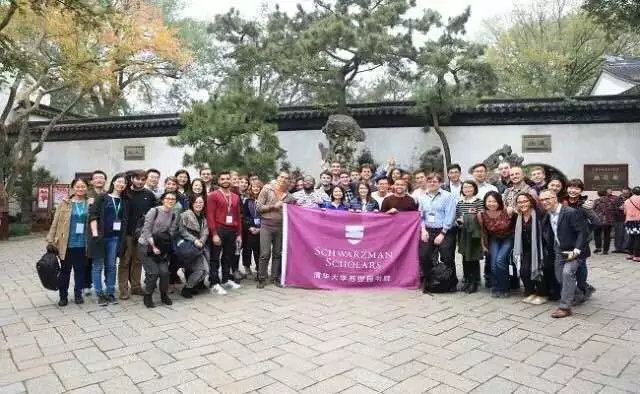
Group photo before the Humble Administrator Garden
Deep Dive was jointly guided by many professors from Tsinghua University, Xi'an Jiaotong University, Northwest University and Suzhou University. Jason Wenhao Cheng, Associate Dean, Schwarzman College, Tsinghua University, and Gao Xudong, College Chief Professor, and others led the Scholars to participate in different investigation and researches for the entire trip. The leading academic professors of seven branches were composed of the professors from School of Economics and Management, Tsinghua University, School of Social Sciences, Tsinghua University, School of Humanities, Tsinghua University, Institute of Education, Tsinghua University and China Institute for Rural Studies, Tsinghua University. The program also involved some professors from Xi'an Jiaotong University, Northwest University and Suzhou University, who served as guides to ensure that the Scholars could understand the respective regions better. The program also required the Scholars to preview the literature materials, to carry out on-spot researches, to hold group discussions on everyday reflection from the trip, and to hand in the acquired homework in paper, in order to realize the teaching objective of enabling the Scholars to approach the real problems in an all-around way from a historical and macro perspective. Following this, Schwarzman College held a Deep Dive Symposium, inviting the involving local units and the leading faculties to listen in on the Scholars’ achievements and to give their reviews and feedbacks.
Cheng Jianping, Executive Vice President of Tsinghua University, said that Deep Dive delivered the rich information, beautiful memories and deep friendships to the Scholars, strengthening their determination and perseverance in shouldering the great responsibilities for promoting their countries’ development, the humanity progress, and world peace. He expressed that he hoped all the young talents from all over the world could start to learn Chinese aspects all over again, beginning with areas such as Chinese politics, economy, society and culture, to deepen their understanding of China and to build a strong friendship with the Chinese people.